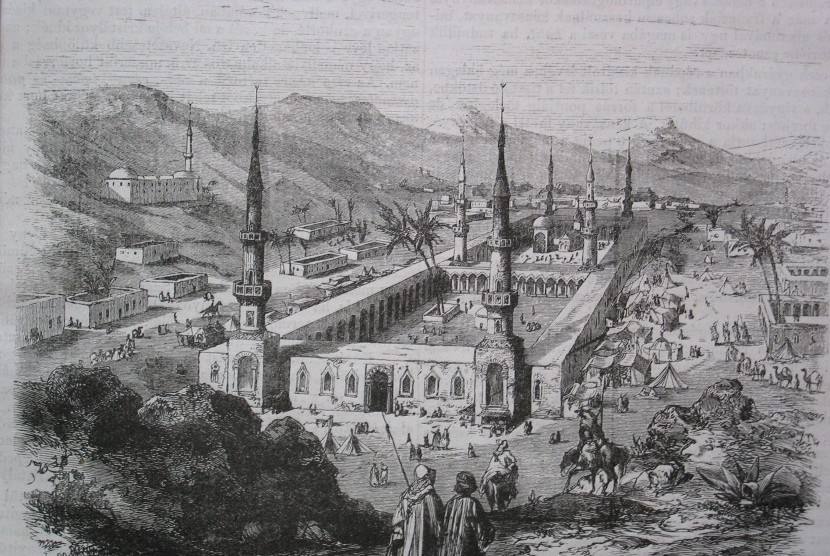History of Ramadan Fasting and Fasting of Previous Prophets

The prophets before the Prophet Muhammad (Rasulullah SAW) practiced fasting. History records that Muslims began receiving orders to fast during Ramadan in the second year of Hijri.
At that time, the Prophet Muhammad had lived in Medina al-Munawwarah for only 18 months, after moving from Makkah al-Mukarramah.
In the Koran, the obligation to fast during Ramadan originates in surah al-Baqarah verse 183. This word of Allah SWT came down at the end of the month of Sha'ban.
“O you who believe! Fasting is obligatory upon you as it was prescribed for those before you so that you may be pious.”
The tradition or obligation of fasting does not only apply to the people of Rasulullah SAW. In fact, the verses of the Koran above clearly show that the believers who came before him had done fasting.
According to the legendary Muslim historian Ibnu Katsir, the teachings of fasting have even existed since the time of Prophet Adam AS and Eve. Prophet Adam, he said, fasted for three days every month throughout the year.
There are also those who say that Adam fasted on 10 Muharram as a gratitude for meeting his wife, Hawa, at Arafah.
Another history states that Prophet Adam fasted one day and one night when Allah sent him down from the garden of heaven. Some say Adam fasted 40 days and 40 nights every year. Another opinion says Adam fasted in order to pray for his sons and daughters.
Apart from that, some explain that Adam fasted on Friday to commemorate an important event, namely the creation of him by Allah, the day he was sent down to earth, and the acceptance of Adam's repentance by Allah.
Although neither the Qur'an nor the hadith explain how Adam's fast and the generations after it took shape, there are indications that the religions brought by the earlier apostles were monotheistic religions that taught belief in the oneness of God (Allah).
Noah's fast
According to a history, Prophet Noah fasted for three days every month throughout the year, like the fast of Prophet Adam. Prophet Noah also ordered his people to worship Allah and fast when they lived for months adrift in a large boat in the middle of a wide ocean due to a major flood, while repenting to Allah.
Al-Hafizh Ibn Kathir in the Acts of the Prophets and Apostles, quotes Ibn Majah about Noah's fasting. Rasulullah SAW once said, "Noah's fast is a whole year, except the days of Eid al-Fitr and Eid al-Adha."
In another narration, Abu Qatadah from Zaid bin Rabah Abu Faras, heard Abdullah bin Amr say, "I heard the Messenger of Allah say, 'Nuh fasted a whole year, except the days of Eid al-Fitr and Eid al-Adha. David fasted half a year. Abraham fasted three days every month, fast one year and break one year."
According to Ibn Kathir, the hadith was included by al-Haitsami in ath-Tabari. "However, I have not got it," said the interpreter.
Prophet Ibrahim AS was also famous for his penchant for fasting, especially when he was about to receive revelations from Allah, which was later made Ibrahim's temperature. Fasting according to the Abrahamic religion is carried out by Ismail, the son of Abraham who is known to be devout in worship; and the Abrahamic fast was also followed by Ishaq (Ibrahim's son from Sarah).
Prophet Ya'qub is famous as a parent and apostle who likes to fast, especially for the safety of his sons. Meanwhile, Prophet Yusuf fasted while in prison with the other convicts. He also applied this fasting habit when he was a dignitary in Egypt and served as the country's economy minister.
"Because I'm worried that when I'm full, I'll forget about the stomach of the poor," said the Prophet Yusuf.
Prophet Yunus fasted from eating and drinking while in the belly of a large fish for several days, then breaking his fast after being vomited back from the fish's stomach. To break the fast, it is said, he ate a kind of pumpkin that grows on the beach.
The prophet Ayub fasted when he lived in poverty and suffered from illness for years, until he was finally released from the ordeal. The Prophet Shuaib was famous for his piety and as an old man who fasted a lot in order to fear Allah, in addition to living a simple life and for the preservation of the next generation.
Prophet Musa fasted for 40 days and 40 nights in preparation for receiving revelations from Allah on Mount Sinai. Prophet Ilyas did the same thing when he was going to Mount Horeb to receive revelations from Allah. Meanwhile, Prophet Isa began fasting when he began appearing in public to declare himself as an apostle.


